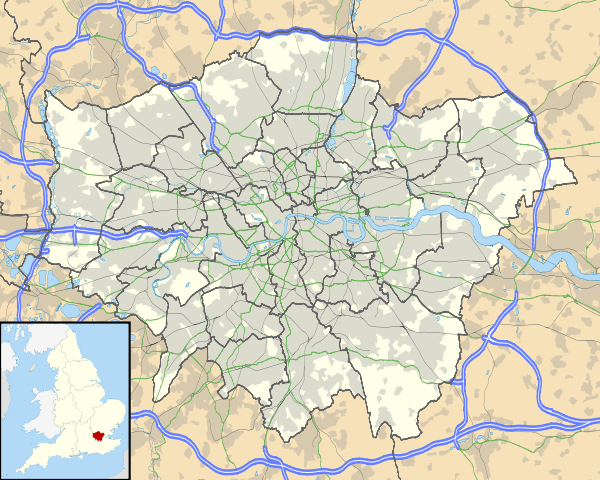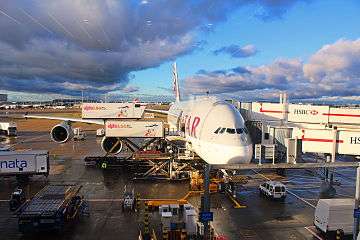Heathrow Terminal 4
| Heathrow Terminal 4 | |
|---|---|
|
Aerial view of terminal 4 | |
 Location within Greater London | |
| General information | |
| Type | Airport terminal |
| Address | Stratford Road, Hounslow, London, TW6 3XA |
| Coordinates | 51°27′34″N 0°26′49″W / 51.459455°N 0.446953°W |
| Current tenants | SkyTeam Alliance |
| Inaugurated | 1 April 1986 |
| Renovated | 2009-2017 |
| Cost | £200 million |
| Technical details | |
| Floor area | 105,481 square metres (1,135,390 sq ft) |
| Design and construction | |
| Architect | Scott Brownrigg & Turner[1] |
Heathrow Terminal 4 is an airport terminal at Heathrow Airport, the main airport serving London, United Kingdom, situated to the south of the southern runway, next to the cargo terminal. It is connected to Heathrow Terminals 2 and 3 by the vehicular Heathrow Cargo Tunnel, and by rail with the Heathrow Terminal 4 tube station and Heathrow Terminal 4 railway station.
Built at a cost of £200 million, Terminal 4 was opened by the Prince and Princess of Wales on 1 April 1986.[2] Until 2008 it was used mainly by British Airways. It became the Heathrow base for airlines of the SkyTeam airline alliance after British Airways vacated Terminal 4 on 29 October 2009 and moved to Terminal 5.
Overview
Terminal design
The terminal was initially designed as a facility for short-haul 'point-to-point' traffic, to compensate for its relatively long distance from the airport's central terminal area (CTA). The layout of the terminal, with passenger boarding gates very close to the check-in and security halls, was designed to facilitate rapid movement of passengers through the building (a requirement for short-haul, business-focused flights). Upon opening, it boasted other innovations including the complete segregation of arriving and departing passengers and a departure concourse over 1⁄3 mile (0.54 km) long.[3]
Lord King, then Chairman of British Airways, demanded that Terminal 4 be solely for the use of British Airways to fulfill the airline's ambition of hosting all its flights in one terminal (an ambition that has still not been realised even with the opening of Terminal 5 in 2008). A similar demand was made on the North Terminal at Gatwick.
Thus Terminal 4's distance from the CTA and design were ill-suited for British Airways' long-haul operations and could be seen as a contributor to the airline's dire operational performance, particularly in the years up to Terminal 5's opening in 2008. For example, passengers had to transfer between Terminal 4 and the CTA by bus rather than by a short moving walkway (as between Terminals 1 and 3 for example) and once inside Terminal 4, the gate areas are not large enough for the 400+ passengers waiting to board the waiting 747s. Passengers' baggage also had to make the trip by van, sometimes resulting in the luggage being mislaid, although this problem was somewhat alleviated in the late 1990s by the construction of an automated transfer tunnel between the CTA and Terminal 4.
Improvements and renovations
Following the transfer of most of British Airways' flights to Terminal 5 during 2008, Terminal 4 underwent a £200m upgrade to enable it to accommodate 45 airlines and serve as the base for the SkyTeam airline alliance. The departures forecourt has been upgraded to reduce traffic congestion and improve security and an extended check-in area opened in late 2009. Most internal areas of the terminal were renovated between 2009 and 2014, whilst a new SkyTeam Alliance passenger lounge for premium passengers opened in 2009, more recently followed by the Etihad Airways Lounge. A Malaysia Airlines Golden Lounge, Gulf Air Golden Falcon Lounge, Qatar Airways Premium Lounge and Plaza Premium Lounge have all opened since 2010. Two new stands to accommodate the Airbus A380 were constructed in 2009, and a further two opened in 2015. A new baggage system has also been installed. Refurbishment of the arrivals areas is ongoing as of early 2016.[4]
Usage


SkyTeam
All SkyTeam members with operations at Heathrow fly from Terminal 4, except Garuda Indonesia which uses Terminal 3 and Middle East Airlines, which has not transferred its flights from Terminal 3 since it joined the alliance. Delta has moved all flights to Terminal 3 on 14 September 2016 to ease connections with partner Virgin Atlantic.[5]
Oneworld

Two Oneworld members fly out of Terminal 4, Malaysia Airlines and Qatar Airways. Both have joined the alliance since moving to Terminal 4. Sri Lankan Airlines formerly operated from Terminal 4 but shortly after it joined Oneworld in 2014 it transferred its flights to Terminal 3.
Star Alliance
Air India has joined Star Alliance in 2014 and no date has been given for its flights, 3 daily to Delhi and 2 daily to Mumbai, to transfer to Terminal 2. Since 17 September 2014, when the final Star flights left Terminal 3, Terminal 4 is the only terminal at Heathrow to serve all 3 alliances.
Airbus A380 and Boeing 747
Malaysia Airlines, Qatar Airways and Etihad fly the Airbus A380 into Terminal 4. Malaysia uses it on both Kuala Lumpur flights, Qatar on 2 of its 6 daily flights to Doha. Etihad uses the A380 on 2 of its 3 daily flights, and will upgrade the third from 3 August.
Once home to British Airways' fleet of Boeing 747s, which at one time numbered 57 aircraft, Terminal 4 now only receives occasional Boeing 747 flights from Kuwait Airways and EL AL.
Airlines and destinations
In 2015, Terminal 4 handled 9.2 million passengers on 53,357 flights, 12.3% of the airport's passengers on 11.5% of its flights. This made it the least busy terminal by both passenger and flight numbers.[6] More airlines fly from Terminal 4 than from any other terminal at Heathrow. However most airlines fly to only one destination, with only Air India, Alitalia, Biman Bangladesh, Jet, Kuwait, Royal Air Maroc, Royal Brunei and Saudia flying to two (plus Delta flying to three to 26 October only). This contrasts with Terminals 2 and 3 which have a mixture of airlines with few and many destinations. Many flights are only once daily (some are not even that frequent).
- Notes
- ^1 Biman Bangladesh Airlines' flight from London to Dhaka makes a stop at Sylhet, and the airline sells flights solely between London and Sylhet. However, the flight from Dhaka to London does not stop at Sylhet.
Ground transportation
Road links
Terminal 4 is accessed from Junction 14 of the M25 motorway via the A3113 and then the Southern Perimeter Road. It is also accessible from Central London via the A4 and then the A30. There is a short stay car park directly opposite the terminal and a long stay car park on the other side of the twin rivers.
Rail links
Terminal 4 is served by Heathrow Terminal 4 tube station on the Piccadilly line of the London Underground and by Heathrow Express trains at Heathrow Terminal 4 station. Heathrow Express provides a free shuttle service to Heathrow Central station.[8] At Heathrow Central, passengers can change for free services to Terminal 5, and also for the main Heathrow Express service to Paddington or the Heathrow Connect stopping service. As of May 2015, a standard adult single ticket to Paddington on Heathrow Express is £21.50 if purchased before travel, or £26.50 if purchased on the train.[9] Heathrow Connect offers a standard single fare of £10.10 to Paddington, with fares to intermediate stations ranging from £6.10 to £7.80.[10]
The Piccadilly line has up to 6 trains per hour (about every 10 minutes) in the direction of Cockfosters station via central London. Trains to central London run via Heathrow Terminals 2 & 3 tube station. They may wait at Terminal 4 for up to 8 minutes. Although the journey takes longer, fares are much cheaper than on Heathrow Express or Connect services. As of July 2014, adult single fares to central London stations range from £3.10 to £6.00, depending on the time of day and whether or not an Oyster card is used.[11]
Bus links
Terminal 4 is served by some local buses and coach services.
As of 2009, bus services include:
- 482* – Terminal 5 – Terminal 4 – Hatton Cross – Hounslow West – Southall;
- 490* – Terminal 5 – Terminal 4 – Hatton Cross – Feltham – Twickenham – Richmond;
- 555 – Heathrow terminals 1, 2, 3 – Hatton Cross – Ashford – Sunbury Village – Shepperton – Walton on Thames;
- 557 – Hatton Cross – Ashford – Upper Haliford – Shepperton – Chertsey – Addlestone;
- 724 – Terminal 4 – Terminal 5 – Heathrow terminals 1, 2, 3 – Uxbridge – Watford – St Albans – Hatfield – Welwyn Garden City – Hertford – Ware – Harlow
* – Buses marked with an asterisk run as part of the London bus network on behalf of TfL
References
- ↑ "Retrospective: Heathrow Airport Terminal 4" (PDF). Scott Brownrigg Design Research Unit. November 2013. pp. 4–9. Retrieved 1 November 2016.
- ↑ Above Us The Skies: The Story Of BAA – 1991 (Michael Donne – BAA plc), p. 40
- ↑ Above Us The Skies: The Story Of BAA – 1991 (Michael Donne – BAA plc), p. 41
- ↑ "Terminal 4's £100m new check-in area reaches the top". BAA Plc. Retrieved 30 November 2008.
- ↑ http://atwonline.com/airlines/delta-consolidate-london-heathrow-operations
- ↑ "Heathrow facts and figures". Heathrow Airport. Retrieved 26 October 2016.
- ↑ http://your.heathrow.com/oman-air-launch-new-heathrow-services-record-price-slots/
- ↑ "Heathrow Connect". heathrowconnect.com.
- ↑ "Heathrow Express - Ticket Costs & Prices - Heathrow Express". heathrowexpress.com.
- ↑ "Heathrow Connect". heathrowconnect.com.
- ↑ http://www.tfl.gov.uk/cdn/static/cms/documents/tube-dlr-lo-adult-fares.pdf
External links
![]() Media related to Heathrow Terminal 4 at Wikimedia Commons
Media related to Heathrow Terminal 4 at Wikimedia Commons
Coordinates: 51°27′35″N 0°26′51″W / 51.45972°N 0.44750°W